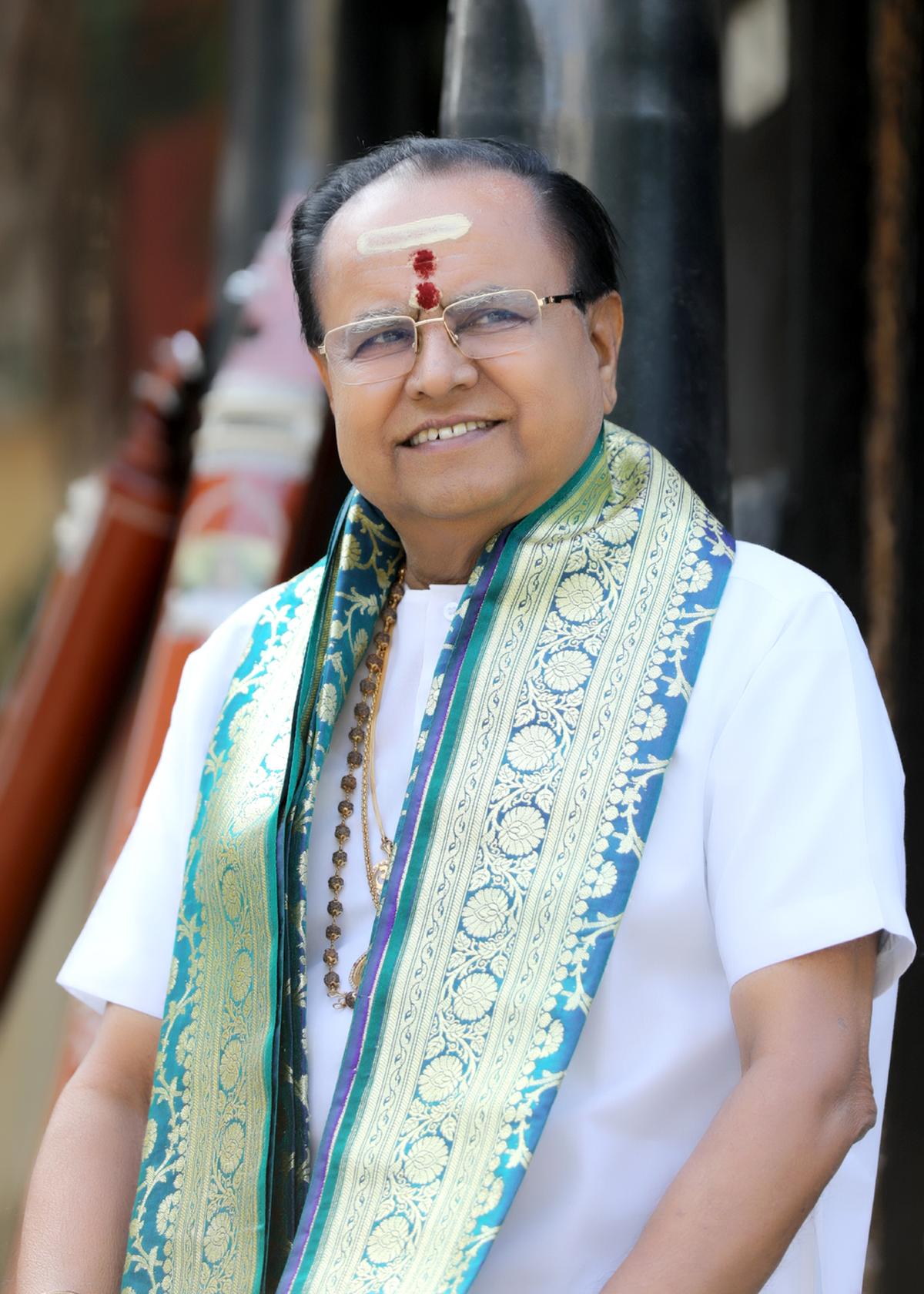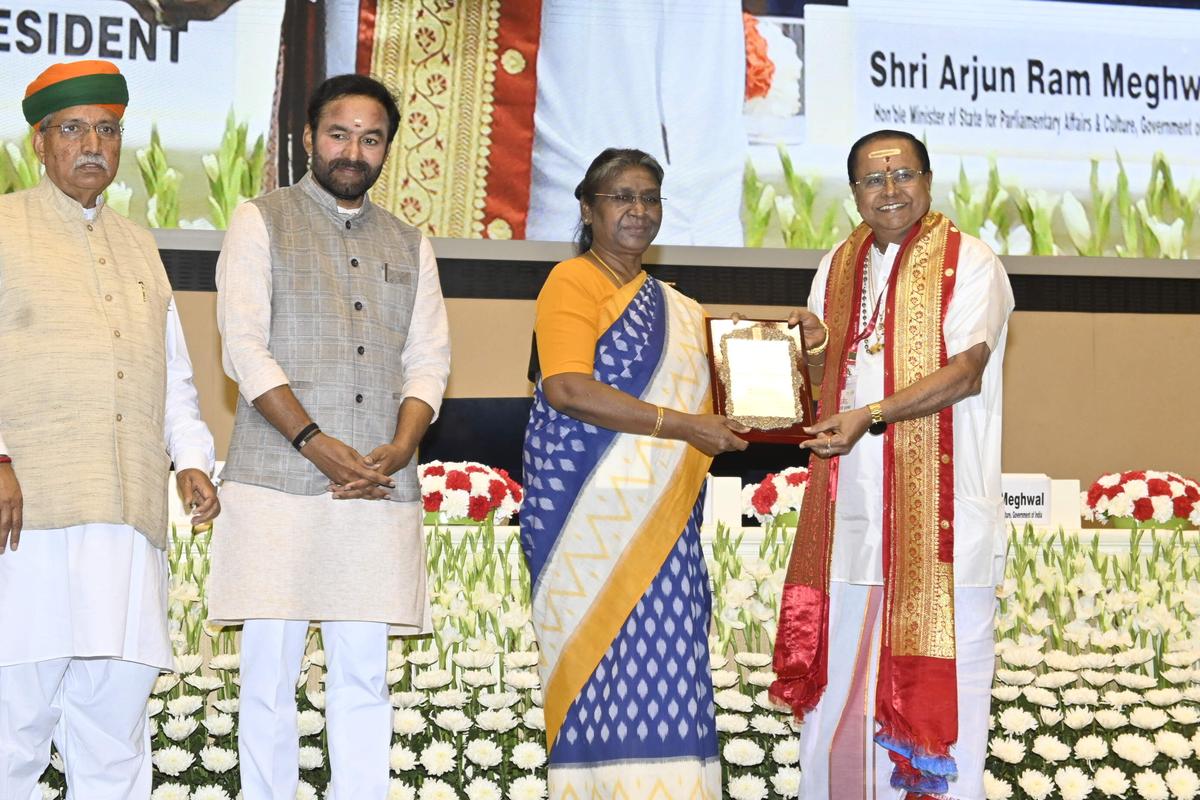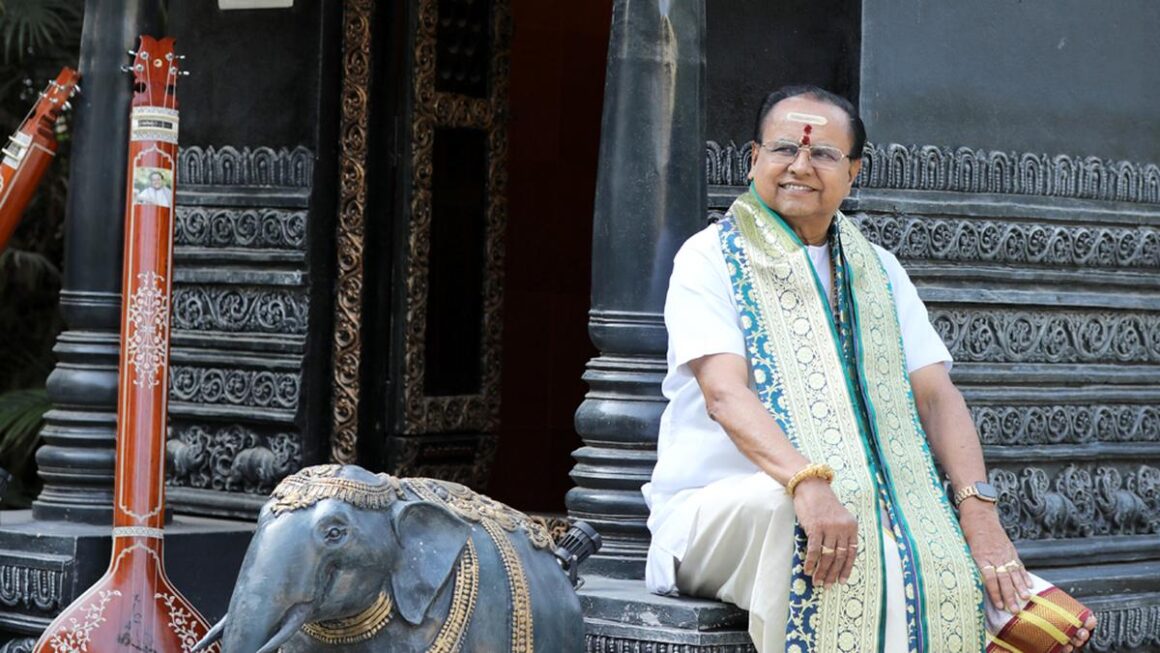Stepping into RK Padmanabha’s home is akin to entering a museum for music. Books, albums, instruments and sound systems share space with photos and awards the maestro has received over the years. “I wanted a sacred space to savour music. My practice sessions and bonding with students happens here with the blessings of Maa Saraswati,” says the Carnatic vocalist.
A Sangeet Natak Akademi awardee, Padmanabha or RKP as he is affectionately known in music circles, turns 75 this week. His enviable range defies his age and at smaller concert venues, he rarely uses a mic, say senior students who travel with him.
Soul call
Born in 1949, it has been 70 years since RKP began singing. “I was born in Rudrapatna, a small village on the banks of River Cauvery in the Arkalgud taluk of Hassan district in Karnataka; it holds the record of producing the most Carnatic musicians in the country. I was not born into a musical family, but Rudrapatna’s soil and air permeate musical tarangas (waves) that birthed melody in me,” he says.
By the time he was five, RKP says he had already heard the top musicians of the time at Ranga-Geete (music theatre). He credits his deep range to this initial exposure where open throated singing was encouraged. “I even took up enacting Karna’s role when I had to sing Kumara Vyasa’s poems during training sessions under the iconic Gamaki, Vasantha Lakshamma,” he recalls.
He goes on to explain how scholar-veteran RV Srikantaiah, a genius, would enthrall connoisseurs with vintage Carnatic classical melodies informally on the streets of Rudrapatna.

Vocalist RK Padmanabha
| Photo Credit:
Special Arrangement
Veterans of classical music who visited Rudrapatna during music festivals, sang in temples, at 100-pillared massive bungalows, and on the banks of the Cauvery. “It was customary to have concerts at every celebration. I was mesmerised by music vidwans, their silk clothes and their body language while they sang. As a six-year-old, I remember waiting for hours to steal a glimpse of Violin Chowdiah — I was in awe of his personality and musical aura,” says RKP, who pursued his higher studies in academics and music, in Mysore.
He eventually enrolled at Violin Chowdiah’s Ayyanar College of Music in Mysore, to begin his formal training in Carnatic music. As a teenager, RKP made his way to Bengaluru and completed his B.Sc from Vijaya College. He represented Karnataka in Ball Badminton and soon bagged a job at SBI.
However, he encountered veteran HV Krishnamurthy at the Vijaya College of Music in 1974, and that marked his return to music. “It seemed magical. Thanks to HVK’s Intense training I had my first concert in 1975.”
Multi-faceted persona
Apart from being a musician, lyricist and composer, Padmanabhan is also an author, teacher and director. With 75 written works to his credit, he has directed several musicals, trained thousands of students across the globe and has acted in musical theatre too. Still at 75, he says, “I have a lot to do, and want to see Bengaluru abuzz with classical melodies. An important part of my spreading awareness is on maintaining shaarira samskarana (voice-culture) — an aspect paramount for musicians.”
He sees my eyes wander to the books and notes piled on his table and says after he worked on ‘Vadiraja’s Teertha Prabhanda’ where he documented the lesser-known aspects of the saint-composer’s visits to the 10 sacred rivers in India, he was inspired to write on the saints Shankara-Ramanuja-Madhwa. “Vadirajaswamy blessed me with my pen and voice. I wanted to give back to society so I built the Vadiraja Kala Bhavana near Hulimavu, to host musical events.”

Vocalist RK Padmanabha receiving the national award from President Murmu
| Photo Credit:
Special Arrangement
RKP’s written works include five music-based novels as well as 750 compositions in Kannada, Sanskrit and Telugu. “I have composed Navagraha kritis in Kannada and set them to music, apart from 72 compositions in all the Melakarta ragas in Kannada,” he says.
Talking of what he has enjoyed apart from writing his autobiography, RKP says it was gratifying to research the book, Purandara Pitamahare, where he sheds light on the greatness of Purandara dasa while dissecting his contemplative genius.
“Did you know why Purandara dasa might have preferred Mayamalavagowla for initial lessons to Karaharapriya? Karaharapriya, a musical scale in vogue decades ago, has high frequency levels for swara prayogas and oscillations. What made Mayamalavagowla special was its flat notes, making it ideal for beginners. As a true Pitamaha, Purandara had the foresight to offer basic Carnatic lessons in Mayamalavagowla.”
Good governance
His musical ventures aside, RKP also holds other important offices. As the Managing Trustee of Rudrapatna Sangeetotsava Samiti Trust, he is responsible for the Sangeeta Grama, an annual Sangeethotsava, now in its 22nd year. RKP is also overseeing the building of a Saptaswara Temple at Rudrapatna, themed around the seven musical notes with a 70-feet tambura on the exterior.
For the past 20 years, he has been president of the Karnataka Ganakala Parishat, a sabha that promotes the musicians of Karnataka. RKP says the Parishat’s activities reaches rural pockets in all the districts and towns with performances, schooling and workshops to bring an awareness of classical music to all.
RKP will be felicitated at Purandara Mantapa, ISRO layout on September 29, at 6pm. Entry free.
Published – September 25, 2024 11:56 am IST


Leave a Reply